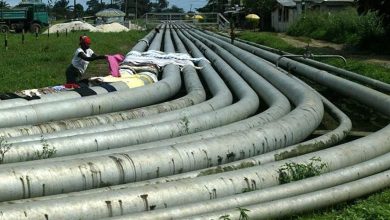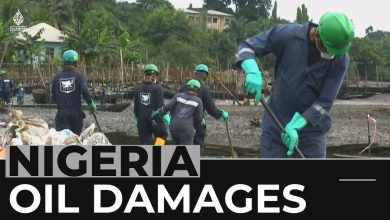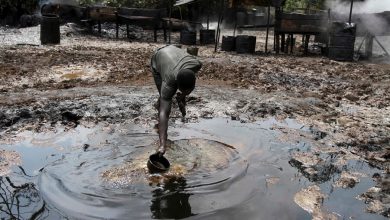Ogoni Women’s Climate Justice Was Decades Ahead of Today’s Debates by Domale Keys
The story of the Ogoni women of Southern Nigeria makes the term “climate change” seem nonsensical. The climate didn’t simply change—someone altered it.
“They were ready to take the oil, and we told them they would no longer take the oil. Even in Dere, they packed up and left,” Karalole, a member of the Federation of Ogoni Women’s Association (FOWA), proudly declared as she recounted the nonviolent demonstration she along with other Ogoni people of the Southern Nigerian ethnic group participated in that ultimately led Shell Oil to abandon their drilling site in their land.
In 1993, through FOWA, Ogoni women alongside their community launched a movement that would declare to Shell and the world that they would no longer stand by and watch oil companies devastate their lands—devastation that has resulted in what many now term “climate change.” However, the Ogoni women’s story makes the term “climate change” seem nonsensical because from where they stand, the climate didn’t simply change—someone altered it.
For the first two weeks of November 2021, world leaders met at COP 26—the United Nations Climate Change Conference in Glasgow—to discuss how to curb this issue most frequently known as climate change. Climate change, global warming and climate crises are all terms used to describe the current pending emergency the world is experiencing. Many of these terms hide the primary actors, mainly corporations and big businesses, who are responsible for the issues we are facing, and suggests that the climate is simply changing. However, when we focus on Global South women and women of color whose lives are most impacted by this issue, the problem seems a lot less elusive. Then we can put faces to the problems that tend to hide behind fancy jargon.
Over the course of three years, I visited with members of FOWA, a women’s wing of the broader Movement for the Survival of Ogoni People, to learn more about their struggle to improve their land, livelihood and communities which has been devastated by the negligence of oil companies and government policies. They shared about the history of their struggle and ways they believe the government can help them achieve their aim.
Shell began oil exploration in Ogoni in 1958. Since then, their land has been subject to deadly pollution and the Ogoni people have been making pleas for improvement of their circumstances from the start. Following a major oil blow-out in 1970, the Ogoni people wrote a letter to the then governor of Rivers State stating that their complaints to both the government and Shell continues to fall on deaf ears:
“Your Excellency, neither from the Shell-BP nor from the successive Governments have we received the slightest consideration in the widespread destitution that has been our sad lot as a direct result of the oil industry in the Ogoni Division. The uprooted and displaced farmers are left without alternative means of subsistence.”
In response to the Ogoni people’s mention of issues of injury, environmental degradation and displacement caused by the blowout, Shell shirked responsibility of its actions in devastating Ogoni. Shell’s repeated response has that they are following the law and that Ogoni people must take up matters with their respective local and national government representatives. It didn’t matter that the colonial government and the subsequent independent government owned nearly half of Shell’s subsidiary in Nigeria before and after independence.
In the 1990s, when Ogoni women joined their community in a movement to protest the oil companies’ practices, they gave Shell an ultimatum to pay back a share of the oil proceeds to the Ogoni people equivalent to the percentage set from the outset of oil exploration or close down drilling stations in the community. At their refusal, Ogoni people declared Shell persona non grata, ousting them from their land. Still, corroding oil pipes running through Ogoni land continued to cause oil spills and oil blowouts.
To the consequences of these companies practices on their land and crops, one Ogoni woman said: “We are hungry and we plant and nothing comes of it, because they have drawn all the oil from us. If you plant cassava, it doesn’t grow. You won’t harvest yam that will amount to any type of yam that you can eat because the oil has polluted everything. All the cassava, there’s a look to it, its leaves looks like grass not like cassava leaves.”
Furthermore, nearby oil refineries continue to pollute the air contributing to acid rain and devastating the people’s health.
Ogoni women—the ones most often responsible for farming and trading in their communities—have suffered most from the environmental damage in their land. The oil pollution has greatly diminished the yields they used to have from their land, the excess of which they often sold in the marketplace to raise extra funds which supports the family including children’s education.
In 2011, as a result of the Ogoni people’s organizing, a United Nations Environment Program (UNEP) report was conducted to assess the environmental damage that has occurred in Ogoni from oil activities. The report found that damage to the environment were so extensive it could take 25-30 years to clean-up oil pollution in Ogoni land.
Last year, Nigerian farmers won a lawsuit against Shell and the court ordered Shell to pay the communities for damages caused by oil spills. And a Dutch court ruled last summer that Shell must reduce CO2 emissions by 45 percent by 2030 as opposed to the 20 percent plan they are currently on, a decision Shell declared it would appeal.
COP 26 is led by the same body that developed the Paris Agreement in 2015, a treaty on climate change which aims to limit global warming to “well below 2, preferably 1.5 degrees Celsius compare to pre-industrial levels.” One of the goals of the 2021 meeting was to “encourage countries affected by climate change to protect and restore ecosystems…and agriculture to avoid loss of homes, livelihoods and even lives.”
To this aim, Nigerian President Buhari vowed to work toward this goal through the Great Green Wall (GGW) Initiative: “I am optimistic that Africa’s ambition of restoring over 100 million hectares of degraded landscape for productive agriculture is achievable,’’ he said. However, there has been little detail given as to how this restoration of lost lands will happen. Meanwhile, the Ogoni people are still fighting for the implementation of the recommendations from the UNEP report including a thorough clean-up of their land.
Oil has been identified as the second leading cause of CO2 emissions behind coal. The discussion about the continued reliance on oil is important because it is the one resource that individual consumers have the most direct contact with. In addition to the promise to restore ecosystems, a group of 20 nations, including the U.S., vowed to cease investing in oil production abroad, but this means that they can continue to drill at home. However experts have noted that if the world is to realize its goals of keeping the temperature below 1.5 degree Celsius increase by 2050, it must leave the remaining fossil fuels including coal, oil and gas unextracted and in the ground.
It appears then that in demanding that Shell cease its oil drilling activities in their land, the Ogoni women were decades ahead of the science. How did they do it? Through nonviolent organizing.
Karalole recalls the day they banned Shell in the following way: “They all simply stood there and watched us. There is power in the palm branch that Ken showed us. This palm branch is the bullet you see. All of us carried gu sa.”
Karalole pays homage to Ken Saro-Wiwa, the human rights leader who served as the spokesperson for Movement for the Survival of the Ogoni People and encouraged the use of nonviolence in their struggle until he was brutally murdered by the Nigerian dictatorial regime in 1995. In this way, the small seemingly powerless ethnic group was able to declare their land would no longer be degraded to further corporate profiteering companies.
In the United States, despite sweeping promises at COP 26, fossil fuel extraction nearly resumed in the Gulf of Mexico when the first major bid for oil drilling leases occurred in the week following the climate talks. On Nov. 17, “Shell, BP, Chevron and Exxon Mobil offered $192 million for the rights to drill in about 1.7 million acres in the area offered by the government,” according to New York Times journalist Lisa Friedman. However, shortly after environmental groups sued the administration’s sale of the leases, citing that the sale was made by relying on outdated information concerning the extent to which the oil and gas leases would contribute to climate change. The environmental groups won the suit and a decision by the D.C. District Court agreed to revoke the sale of the leases until further analysis of the true environmental impact of new drilling activity could be conducted.
As this lawsuit only buys time, the question remains whether the U.S. government, other individuals and communities across the world including major oil consumers in the U.S. will follow the Ogoni women’s example in putting an end to the extraction of new fossil fuels, push for investment in renewable energy resources and press energy companies to comply.




